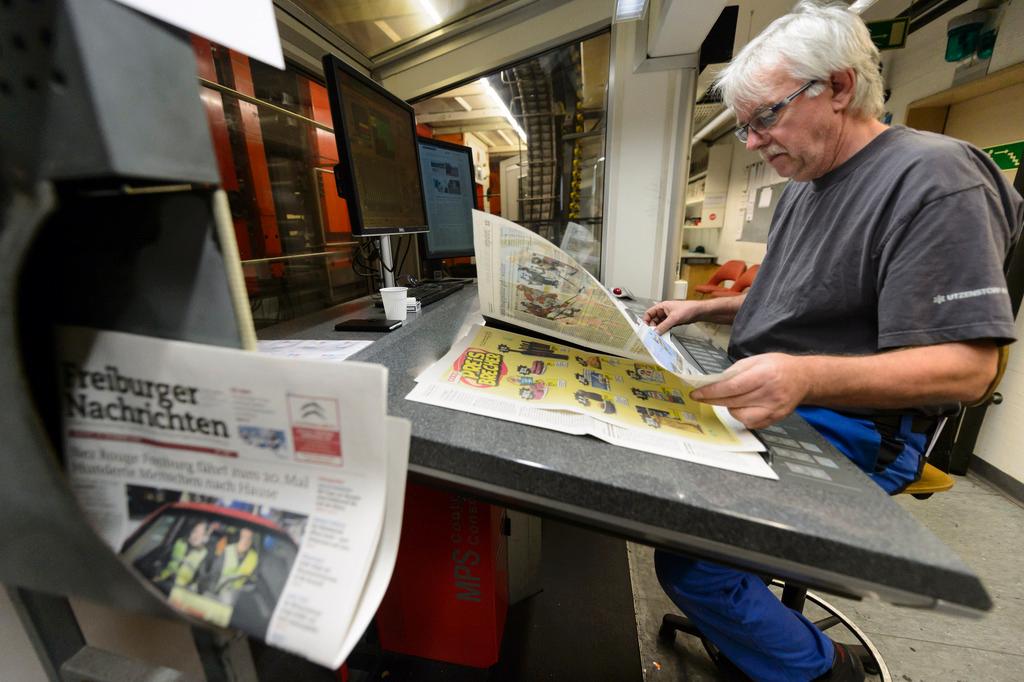Taking early retirement – but at what cost?

When an employee reaches a certain age, they’re sometimes “offered” early retirement. Although it might solve staffing and financial issues for the company, it has a knock-on effect on the pension system and is a major cause of concern for the over-50s.
“They were cutting down the headcount. You constantly live with the fear [of being made redundant] in such a climate.”
Alexis Barbic was 60-years-old when he took early retirement from UBS last year. At the time, men could retire at 62.
“They said that the older employers wouldn’t be part of the headcount cuts, but in the last two years this wasn’t the case,” he told swissinfo.ch. He grew tired of working in such an “atmosphere” and asked for early retirement as a way out.
“It’s a trend that older employees will be familiar with,” said Vania Alleva, co-president of the trade union, Unia and vice president of the Trade Union Federation. “The risk of becoming unemployed is increasing for over 55-year-olds, and even from age 50, depending on the industry.”
“If we look at the vote on February 9 [a nationwide vote in Switzerland in 2014 to limit immigration], the age group 50-59 voted in favour of this initiative. It showed they are afraid.”
Knock-on effect
The over-50s are in a “precarious” situation, according to Alleva. They’re afraid of losing their jobs – something “we have to take seriously”. But it’s a cause for concern not just for the employees wondering what their future holds and how long their employer will still see them as worth investing in. The impact early retirement has on the economy and the pension system overall is large.
The current retirement age in Switzerland is 65 for men and 64 for women, but it can be taken earlier by one or two years. In an ageing population, if people stop earning and in turn stop paying into the system, the funds available will be even lower in the years to come.
The issue has attracted enough attention for economics minister Johann Schneider-Ammann to call a national conference on the theme of employment and older workers. Trade unions, employer’s associations and representatives from Switzerland’s cantons were brought together to see what could be agreed upon to keep the more mature members of the workforce in jobs and paying into the pension funds.
Unions want the over-50s to be given specific support and investment – “On the one hand we want better protection from redundancy, on the other hand, better protection from discrimination – while looking for work and while in employment,” said Alleva.
An ageing population is concentrating the pressure felt by pension schemes. They’re also experiencing problems due to current economic policy in Switzerland such as negative interest rates.
When it comes to employment rates in the 55-64-year-old age group Switzerland is above the average among Organisation for Economic Co-operation and Development (OECD) countries, 71.7% compared to 54.9%.
However, 58.6% of those unemployed people aged over 55 in the Swiss labour force were classified as long-term unemployed in 2013 (without a job for longer than a year). That’s slightly higher than the EU average (57%), and higher than the OECD average (46.6%). And bit by bit, it’s been growing.
Could a commitment to keep training older workers contribute to solving the problem?
This should be offered by employers, Alleva says, but the experience older workers have to offer is something that should not be underestimated either.
“It’s short sighted to look at older workers as people without the right skills. Industries that drop these people before the retirement age are missing out on them as a resource. It’s important to invest in them.”
Looking at Barbic’s experience, he would have stayed with the company if his employer had got behind him and assured him that his job was safe. “I would certainly have considered this [staying], because I liked the work…the job was interesting. Having the assurance that I could continue to work until official retirement, of course I would have accepted it.”
Change without regulation?
From an employer’s perspective, any official moves, such as those that might come out of the government conference on older workers to stop this age group being shown the cold shoulder, could be seen as placing additional restrictions on companies who are already battling two major current economic problems for Swiss firms – the impact of the high Swiss franc and impending quotas on employing foreign workers.
“Ultimately we have a demographic problem. In a few years there will be more people that have retired than have been born,” Valentin Vogt, president of the Swiss Employers Association told swissinfo.ch. “It’s important that we look after all the potential that we have…as ten years from now this will be a big problem.”
Speaking after the first sit down as part of the national conference organised by the government, Vogt was concerned about more regulation for industry over this issue. “If we suddenly had protection against making older people redundant, this would be completely counterproductive.” He argues that too many regulations for older workers would put companies off hiring them.
The conference has a long way to go before any concrete measures are announced. Schneider-Ammann labelled it a “roadmap” and said the involved parties would meet again next year.
Boosting employability
While political talks continue, individual projects focused on revamping the employability of older workers are taking place around the country. In canton Schaffhausen in northern Switzerland a scheme to benefit both older workers and companies, and as a result, pension funds, has been running since 2011.
For four months jobseekers over 50 meet at workshops to motivate each other, “sharpen up their profile” and share experiences. Ernst Landolt, a member of Schaffhausen’s cantonal government told swissinfo.ch that “over 500 people have taken part in the schemes…50% of those taking part in the programme find a new job while still attending the course”.
They go on courses to develop their skills and are given a mentor in the workplace. Of course, Landolt went on to say, “there are other people who just can’t find another position”. So what’s at the bottom of it all?
Some employers are of the opinion, Landolt said, that the older workers are “too expensive” or that they don’t have “the right qualifications”.
“We have to fix this picture to give older workers a better chance on the employment market.”

In compliance with the JTI standards
More: SWI swissinfo.ch certified by the Journalism Trust Initiative












You can find an overview of ongoing debates with our journalists here . Please join us!
If you want to start a conversation about a topic raised in this article or want to report factual errors, email us at english@swissinfo.ch.